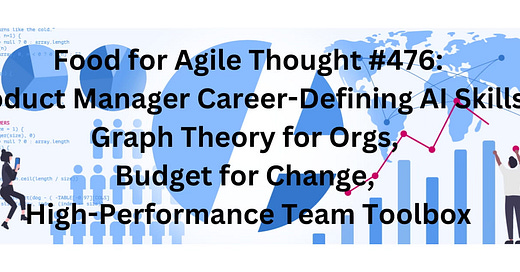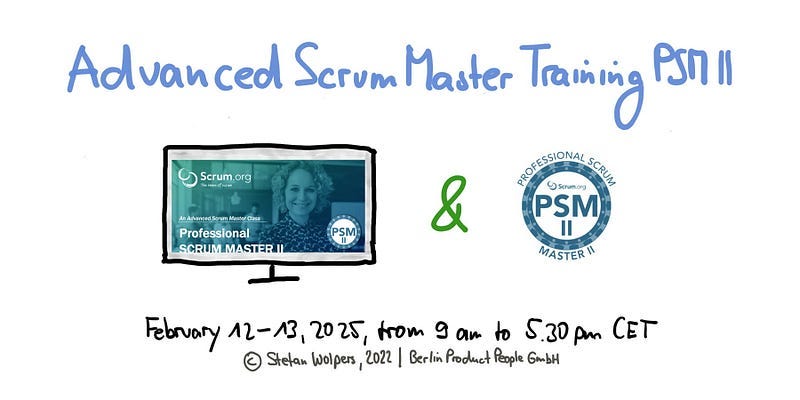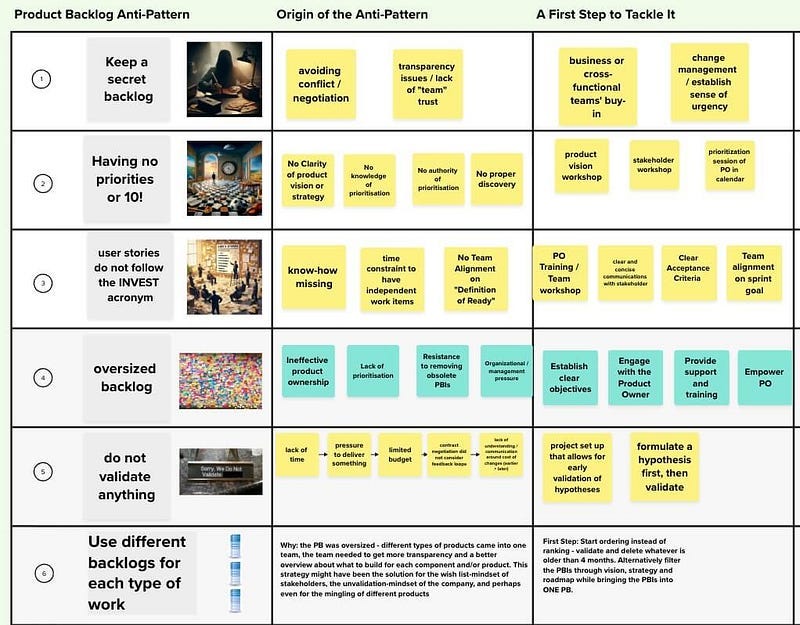Food for Agile Thought #476: PM Career-Defining AI Skills, Graph Theory for Orgs, Budget for Change, High-Performance Team Toolbox
Also: Refactoring Guide for PMs, Pricing Psychology, Backlog Assessment Tool
Hello everyone!
Welcome to the 476th edition of the Food for Agile Thought newsletter, shared with 42,817 peers.
This week, we feature John Cutler on how Lean principles adapt to stabilize scaling challenges, Simon Powers on budgeting strategies for impactful organizational change, and Steven Sinofsky dissecting engineering patterns that fail despite sounding practical. James Hawkins addresses escaping the “deadline doom loop,” while Steve Denning examines the synergy of hierarchies and networks for fostering innovation and competence.
Next, Dan Olsen debunks claims of product management’s demise, highlighting AI’s role in enhancing PM effectiveness. Peter Yang interviews Aman Khan on PM Career-Defining AI Skills in 2025, while Mihika Kapoor shares her playbook for turning bold ideas into viral internal successes. Moreover, David Pereira offers practical guidance on refactoring, bridging technical and business priorities through actionable insights and real-world examples.
Lastly, we explore Stefan Lindegaard’s toolbox for scaling high-performance teams with tools like the Capability Gap Map. Petra Wille highlights trust and generosity as keys to thriving communities, and Melissa Suzuno showcases Vistaly’s role in continuous discovery. Finally, Katelyn Bourgoin shares psychology-driven strategies to shape customer pricing perceptions effectively.
🎓 January 27, 2025: The Advanced Product Backlog Management Course for Just $99!
👉 Please note:
The course includes membership in my former professional students’ brand-new Hands-on Agile community.
The course will only be available for sign-up until February 3, 2025!
Did you miss the previous Food for Agile Thought issue 475?
🎓 Join Stefan in one of his upcoming Professional Scrum training classes!
🏆 The Tip of the Week: Graph Theory for Orgs
John Cutler: Lean Graph Theory
John Cutler explores the interplay of path, DAG, and network models in organizations, emphasizing how Lean principles adapt contextually to stabilize challenges, enhance collaboration, and foster systemic improvements in scaling companies.
Source: Lean Graph Theory
Author: John Cutler
🍋 Lemon of the Week
(via Medium): Story points in Scrum (and Planning Poker)
The author overcomplicates Scrum by pushing 2D matrices and checklist-heavy estimation, missing the fact that Scrum thrives on adaptability, not precision. This bloated approach turns agility into bureaucracy, proving once again that overengineering ruins simplicity.
Source: Medium: Story points in Scrum (and Planning Poker)
➿ Agile & Leadership
Simon Powers: How much does it cost?
Simon Powers explores budgeting for organizational change, highlighting transparency, leadership alignment, and ROI metrics as essential practices for overcoming challenges and driving effective, impactful transformation initiatives.
Source: How much does it cost?
Author: Simon Powers
Steven Sinofsky: Systems Ideas that Sound Good But Almost Never Work — “Let’s just…”
Steven Sinofsky highlights engineering patterns that often sound practical but rarely succeed, like “pluggable systems,” “just add an API,” or “cross-platform solutions,” emphasizing context, first principles, and avoiding oversimplified approaches.
Source: Systems Ideas that Sound Good But Almost Never Work — “Let’s just…”
Author: Steven Sinofsky
james hawkins (via PostHog): The Deadline Doom Loop
James Hawkins explains the “deadline doom loop,” where artificial deadlines harm productivity. He shares PostHog’s alternative approach: small teams, engineer-led decisions, and customer trust to foster faster, sustainable product development.
Source: PostHog: The Deadline Doom Loop
Author: james hawkins
Steve Denning (via Forbes): Why Networks Of Competence Also Require Hierarchies
Steve Denning explores why networks of competence need hierarchies to thrive, using lessons from Henry II’s jury system and Amazon’s transformation to self-organizing teams under Jeff Bezos.
Source: Forbes: Why Networks Of Competence Also Require Hierarchies
Author: Steve Denning
🖥 🇬🇧 Advanced Professional Scrum Master Training w/ PSM II Certificate — February 12–13, 2025
Discover Scrum’s four success principles in this official Scrum.org Advanced Scrum Master training class, which includes the industry-recognized PSM II certification. The PSM II training class is designed as a live virtual class and will be in English.
Enjoy the benefits of a live virtual immersive class with like-minded agile peers from 09:00–17:30 CET.
Learn more: 🖥 🇬🇧 Advanced Professional Scrum Master Training w/ PSM II Certificate — February 12–13, 2025.
Customer Voice: “Dear Stefan, Thanks a lot for two intense and mindblowing days. Your way of teaching suites me perfectly. I must admit that all the positive feedback you have gotten is spot on! I would any time a day recommand your class to a Scrum Master who wants to add a whole new level to his/her scrum game. To all of you reading this. You have to experience Stefans class to understand how good it is.” (Source.)
🎯 Product
Dan Olsen: Product Management is NOT Dead
Dan Olsen debunks claims that product management is obsolete, emphasizing AI’s role in enhancing PM efficiency and strategic focus while reaffirming the enduring need for skilled product managers.
Source: Product Management is NOT Dead
Author: Dan Olsen
Peter Yang: The AI Skill That Will Define Your PM Career in 2025
Peter Yang interviews Aman Khan on why writing AI evaluations is the defining PM skill for 2025, emphasizing curiosity, iterative prototyping, and user-focused metrics to create impactful, real-world AI products.
Source: The AI Skill That Will Define Your PM Career in 2025
Author: Peter Yang
Mihika Kapoor (via First Round Capital): How to Make Your Product Idea Go Viral Inside Your Company: Lessons from Figma Slides
Mihika Kapoor shares her playbook for turning ideas like Figma Slides into viral internal successes, emphasizing storytelling, vision, playful engagement, and persistence to rally support and drive momentum.
Author: Mihika Kapoor
David Pereira: The Refactoring Guide for PMs Tired of Endless Tech Discussions
David Pereira shares actionable insights for PMs on refactoring, from understanding its purpose to navigating challenges and using real-world examples to bridge technical and business priorities effectively.
Source: The Refactoring Guide for PMs Tired of Endless Tech Discussions
Author: David Pereira
📯 Forensic Product Backlog Analysis — A New Team Exercise
The Forensic Product Backlog Analysis: A 60-minute team exercise to fix your Backlog. Identify what’s broken, find out why, and agree on practical fixes — all in five quick steps. There is no fluff, just results.
Want technical excellence and solve customer problems? Start with a solid Product Backlog.
Learn more: Forensic Product Backlog Analysis — A New Team Exercise.
📅 Hands-on Agile 2025 Is Here — Join 550-plus Peers: From Concept-Based to Context-Based Agility
I am thrilled to announce that Hands-on Agile 2025 is officially on the horizon and will be free to attend from February 4–6, 2025. This time, we will focus on how Agile needs to evolve from concept-based agility to context-based agility.
But before we discuss what that means, let’s take a step back and consider why Hands-on Agile 2025 is going to be a can’t-miss event for everyone in the agile community.
For those unfamiliar, Hands-on Agile isn’t just another conference. It’s an event built around the Barcamp model, meaning it’s a self-organized, community-driven gathering with one goal: Sharing knowledge and experiences.
From February 4 to 6, 2025, we will spend three energizing days engaging in sessions, practicing agile games, sharing war stories, and learning directly from each other. Hands-on Agile is all about creating a space for practitioners, coaches, leaders, and newcomers to connect in a truly hands-on way.
👉 Save Your Seat Now! 👈
There are no tickets; Hands-on Agile 2025 is free.
However, you will need to register nevertheless. Otherwise, you would not receive, for example, the invitation to the HoA2025 community or have access to individual session access credentials:
Please note:
For technical reasons, your sign-up confirmation will be sent from stefan [at] age-of-product.com.
Your registration to Hands-on Agile 2025 will also subscribe you to Stefan’s Food for Agile newsletter, one of the largest independent newsletters on agile practices worldwide.
Your invitation to join the Hands-on Agile 2025 community will be limited to February 28, 2025.
🛠 Concepts, Tools & Measuring
Stefan Lindegaard: A Toolbox for High-Performance Teams
Stefan Lindegaard introduces a toolbox for building and scaling high-performance teams, featuring tools like the Capability Gap Map, SEBL framework, and Action Overviews to drive clarity, collaboration, and continuous improvement.
Source: A Toolbox for High-Performance Teams
Author: Stefan Lindegaard
Petra Wille: The Balance of Giving and Taking: Why Community Involvement is a Long-Term Game
Petra Wille reflects on the importance of balancing giving and taking in communities, emphasizing long-term relationships, trust, and generosity as the foundation for thriving, impactful collaborations.
Source: The Balance of Giving and Taking: Why Community Involvement is a Long-Term Game
Author: Petra Wille
Teresa Torres: Tools of the Trade: Building Opportunity Solution Trees in Vistaly
Melissa Suzuno highlights how Vistaly helps teams like ‘The Times London’ build opportunity solution trees, fostering continuous discovery, aligning outcomes with goals, and enabling stakeholder collaboration with its purpose-built, interactive features.
Source: Tools of the Trade: Building Opportunity Solution Trees in Vistaly
Author: Teresa Torres
🎶 Encore
Katelyn Bourgoin (via Demand Curve): 12 Pricing Psychology Tips
Katelyn Bourgoin shares 12 psychology-backed tips to shape how customers perceive prices, from font size to charm pricing, anchoring, and the irresistible power of “free” to drive decisions.
Source: Demand Curve: 12 Pricing Psychology Tips
Author: Katelyn Bourgoin
📅 Training Classes, Meetups & Events 2024
Upcoming classes and events:
🖥 💯 🇬🇧 February 4–8 — FREE Live Virtual Conference: Hands-on Agile 2025 (English)
🖥 🇬🇧 February 12–13 — Live Virtual Class: Professional Scrum Master Advanced Training (PSM II; English)
🖥 💯 🇬🇧 February 27 — Live Virtual Class: Professional Scrum Facilitation Skills Class (PSFS; English)
🖥 💯 🇬🇧 March 6-April 3 — Live Virtual Cohort: Align, Discover, Deliver: The Product Backlog Management Cohort Class (English)
🖥 💯 🇩🇪 March 11–12 — Live Virtual Class: Professional Scrum Product Owner Training (PSPO I; German)
🖥 🇬🇧 March 26–27 — Live Virtual Class: Professional Scrum Master Advanced Training (PSM II; English)
🖥 💯 🇩🇪 April 8–9 — Live Virtual Class: Liberating Structures Workshop: Alle Stimmen hören — 8. und 9. April 2025 (German)
🖥 🇩🇪 April 10 — Live Virtual Class: Professional Product Discovery & Validation Training (PPDV; German)
👉 See all upcoming classes here
🗞️ Last Week’s Food for Agile Thought Edition
📺 Join 6,000-plus Agile Peers on Youtube
Now available on the Age-of-Product YouTube channel:
Hands-on Agile 64: Mastering Work Intake w/ Jeremy Willets and Tom Cagley
Hands-on Agile 62: From Backlog Manager to Product Manager w/ David Pereira
Hands-on Agile 61: Toyota Kata Coaching for Agile Teams & Transformations with Fortune Buchholtz
Hands-on Agile 59: Tackling Fake Agility w/ Johanna Rothman
Hands-on Agile 57: Humble Planning w/ Maarten Dalmijn
Hands-on Agile Extra: How Elon Musk Would Run YOUR Business mit Joe Justice
🎓 Do You Want to Read more like this?
Also:
📅 Join 6,000-plus peers of the Hands-on Agile Meetup group
🐦 Follow me on Twitter and subscribe to my blog, Age of Product
💬 Alternatively, join 20,000-plus peers of the Slack team “Hands-on Agile” for free.









